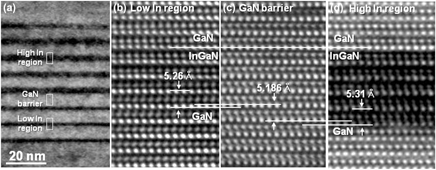Published online by Cambridge University Press: 06 July 2015

A quantitative analysis of In concentration in InGaN/GaN multiquantum wells in light-emitting diodes was carried out using high-resolution transmission electron microscopy (HRTEM) and high-angle annual dark-field scanning TEM (HAADF-STEM). The In composition in InGaN was evaluated by the precise measurement of c-lattice parameters in the HRTEM micrographs, which increase with increasing In composition. The reliability of the results was confirmed by high-resolution x-ray diffraction measurements and Rutherford backscattering spectrometry. Quantitative In compositions can, therefore, be determined using HRTEM. We tried to determine the quantitative In compositions in InGaN by analyzing the intensity profiles of the HAADF-STEM images. However, several problems were encountered, such as differences in the thickness of the region observed, carbon contamination, and ion beam damage during specimen preparation. Therefore, relative differences in composition were observed in the HAADF-STEM images.